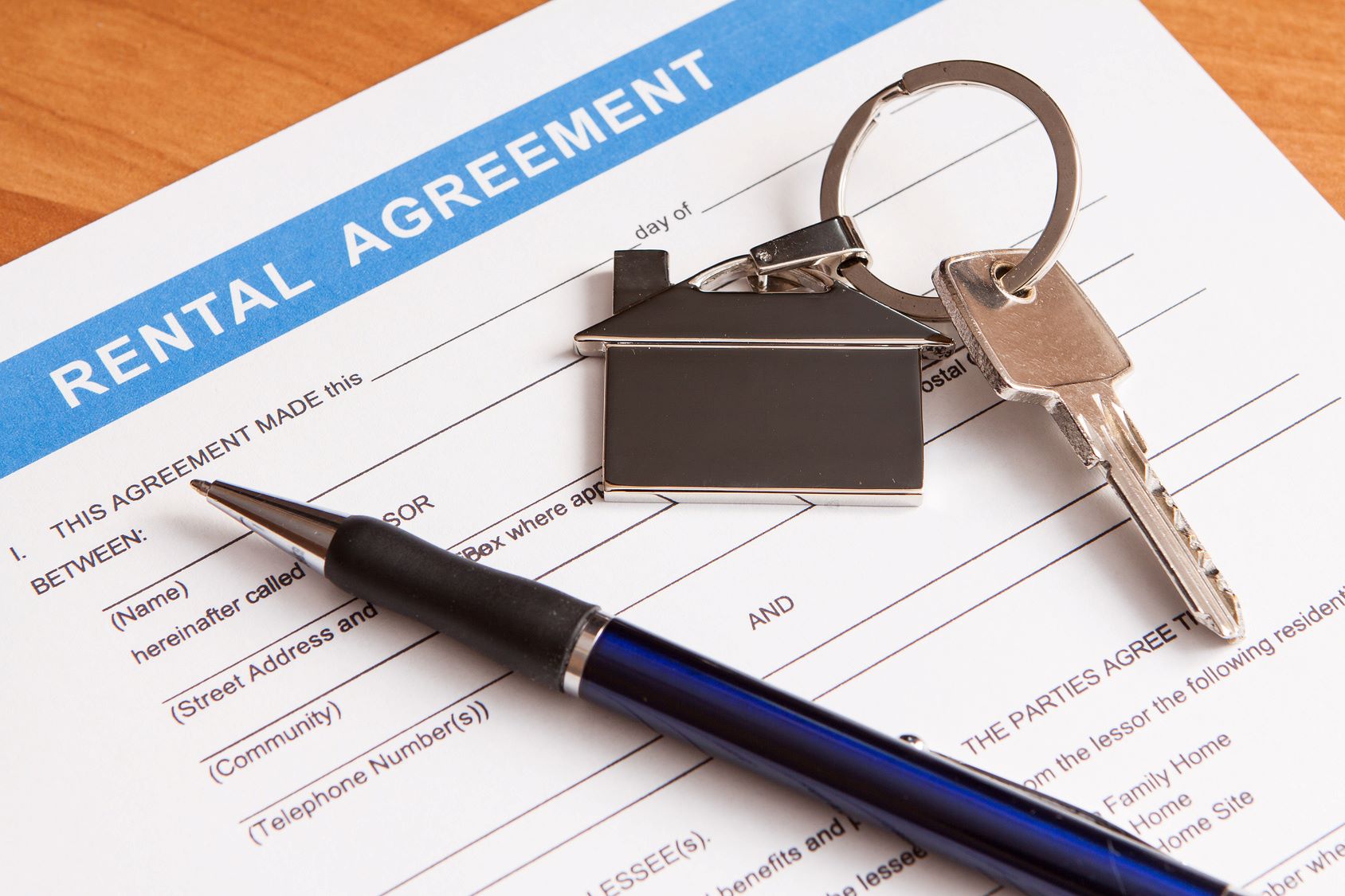

Finance
How To Get Into An Apartment With Bad Credit
Modified: March 6, 2024
Learn how to overcome bad credit and secure an apartment with our expert finance tips. Take control of your financial future today!
(Many of the links in this article redirect to a specific reviewed product. Your purchase of these products through affiliate links helps to generate commission for LiveWell, at no extra cost. Learn more)
Table of Contents
- Introduction
- Understanding the Impact of Bad Credit on Apartment Applications
- Assessing Your Current Credit Situation
- Gathering Necessary Documentation
- Finding Apartments that Work with Bad Credit
- Writing a Persuasive Letter of Explanation
- Offering a Higher Security Deposit or Prepayment
- Seeking a Cosigner or Guarantor
- Presenting Strong Rental References
- Working with a Rental Agency or Apartment Locator
- Negotiating with Landlords and Property Managers
- Improving Your Credit Score
- Conclusion
Introduction
When it comes to finding an apartment, having bad credit can present a significant challenge. Landlords and property managers often use credit scores as a measure of an applicant’s financial responsibility and reliability. A low credit score can lead to rejection or require additional steps to secure a lease.
However, having bad credit does not mean that you cannot find an apartment. There are strategies you can employ to increase your chances of getting approved, even with a less-than-perfect credit history. This article will guide you through the process of getting into an apartment with bad credit.
Understanding the Impact of Bad Credit on Apartment Applications
Before diving into the steps you can take, it is essential to understand how bad credit affects your apartment application. Landlords and property managers may look at your credit report and score to assess your financial stability and ability to make regular rent payments.
A low credit score raises concerns about your past financial behavior, such as late payments, defaults, or excessive debt. These factors can make landlords hesitant to rent to you, as they may worry about the risk of missed or late rent payments.
Assessing Your Current Credit Situation
Start the process of renting an apartment with bad credit by assessing your current credit situation. Obtain a copy of your credit report from one of the major credit bureaus – Experian, Equifax, or TransUnion. Review the report for any errors or inaccuracies that may be negatively impacting your credit score.
…
…
…
Understanding the Impact of Bad Credit on Apartment Applications
When it comes to renting an apartment, your credit history plays a crucial role in the decision-making process for landlords and property managers. They use your credit score as an indicator of your financial responsibility and trustworthiness as a tenant.
Having bad credit can make it more challenging to secure an apartment because landlords may view it as a potential risk. They may worry that you could be unable to pay rent on time or be prone to damaging the property.
Landlords typically assess your creditworthiness by looking at your credit score, which is a numerical representation of your credit history. Scores range from 300 to 850, with higher scores indicating better creditworthiness. Different landlords may have varying cutoff points for acceptable credit scores.
One of the primary concerns for landlords is your payment history. Late payments, defaults, or accounts sent to collections can significantly impact your credit score and raise concerns about your ability to meet rent obligations.
Additionally, landlords consider your debt-to-income ratio, which indicates the percentage of your income that goes toward debt payments. If you have high levels of debt relative to your income, it may raise concerns about your ability to handle the financial responsibility of rent.
Another factor landlords may consider is your credit utilization, which refers to the amount of credit you are using compared to your available credit. High credit utilization can suggest financial strain and may raise doubts about your ability to manage rent payments.
Furthermore, landlords may look at your credit report to assess your overall financial stability. They may be concerned if they see recent bankruptcies, foreclosures, or a history of frequent account delinquencies.
It’s important to note that bad credit does not necessarily mean you will be automatically denied an apartment. Some landlords may consider other factors such as employment history, rental references, or income verification when making their decision. However, it is crucial to be proactive and take steps to mitigate the impact of bad credit on your apartment application.
In the following sections, we will explore strategies you can use to improve your chances of getting approved for an apartment, even with bad credit.
Assessing Your Current Credit Situation
Before embarking on the journey to rent an apartment with bad credit, it is essential to assess your current credit situation. This step will give you a clear understanding of your credit standing and help you determine the best approach moving forward.
Start by obtaining a copy of your credit report from one of the major credit bureaus, such as Experian, Equifax, or TransUnion. You are entitled to a free copy of your credit report once a year, so take advantage of this opportunity.
Once you have your credit report in hand, carefully review it for any errors or inaccuracies. Common mistakes include outdated information, accounts that do not belong to you, or incorrect payment history. Disputing and resolving these errors can potentially boost your credit score and improve your chances of getting approved for an apartment.
Next, evaluate your credit score. Keep in mind that different landlords have different requirements regarding acceptable credit scores. While a low score may make it more challenging to secure an apartment, it does not automatically disqualify you.
Take note of any negative factors that are impacting your credit score. These may include late payments, outstanding debts, or high credit utilization. Understanding these factors will help you address them and work towards improving your creditworthiness.
Consider utilizing online tools and resources that provide insights into your credit score and offer personalized recommendations for improvement. These tools can help you identify specific areas to focus on, such as paying down debts or establishing positive credit habits.
While assessing your credit situation, it is essential to adopt a realistic outlook. Recognize that improving your credit takes time and effort. However, by being proactive and taking steps towards positive financial habits, you can gradually enhance your creditworthiness.
In the next section, we will discuss the necessary documentation you need to gather before applying for an apartment.
Gathering Necessary Documentation
When applying for an apartment with bad credit, having all the necessary documentation prepared can make a significant difference in your chances of approval. By providing the required paperwork upfront, you show landlords and property managers that you are organized, responsible, and serious about renting their property.
Here is a list of essential documents to gather before applying for an apartment:
- Proof of Income: Landlords want to ensure that you have a steady source of income to meet your rent obligations. Gather documents such as pay stubs, employment contracts, or tax returns to demonstrate your earning capacity.
- Bank Statements: Providing recent bank statements can show your financial stability and ability to manage your finances. It gives landlords a clearer picture of your budgeting and savings habits.
- Copy of Identification: Landlords will require a copy of your identification to verify your identity and prevent fraudulent applications. A driver’s license, passport, or state ID will usually suffice.
- Rental History: If you have rented in the past, gather rental references or a letter of recommendation from previous landlords. These references can vouch for your reliability as a tenant.
- Letter of Explanation: It’s important to prepare a letter that explains the circumstances behind your bad credit and highlights any positive changes you have made to improve your financial situation. Be honest and concise in your explanation.
- Character References: If you cannot provide strong rental references, consider asking trustworthy individuals, such as employers or colleagues, to write character references for you. These references can attest to your integrity and responsibility.
Remember to make copies of these documents and keep them well-organized. Having all the necessary paperwork readily available when submitting your application will save you time and demonstrate your commitment to the apartment search process.
In the next section, we will discuss how to find apartments that are willing to work with applicants with bad credit.
Finding Apartments that Work with Bad Credit
Searching for apartments that are more lenient towards applicants with bad credit requires some strategic planning. While it may pose a challenge, there are still options available to you. Here are some strategies to help you find apartments that are willing to work with bad credit:
- Look for smaller and privately-owned properties: Larger apartment complexes with strict management policies may have stricter credit requirements. Focus on smaller buildings or properties that are privately owned, as they might have more flexibility in their application process.
- Explore rental listings from individual landlords: Individual landlords tend to have more discretion when it comes to evaluating applications. Use online rental platforms or check local classified ads for listings posted by individual landlords who are open to working with tenants with bad credit.
- Connect with local real estate agencies or apartment locators: Agencies and locators often have inside knowledge of available rentals and relationships with landlords. They can assist in finding apartments that may be more open to tenants with bad credit.
- Consider subletting or room rentals: Subletting or renting a room in an existing lease can be more flexible options for individuals with bad credit. These arrangements may have less strict credit requirements compared to signing a lease on your own.
- Utilize online rental platforms: Use websites and apps that cater specifically to individuals with bad credit or provide alternative solutions for renting. These platforms often connect renters with landlords who are willing to work with applicants with less-than-ideal credit histories.
- Network within your community: Spread the word among friends, family, colleagues, and social networks that you are looking for an apartment. Sometimes, personal connections can lead to opportunities or recommendations for landlords who may be understanding of your credit situation.
When reaching out to potential landlords, be upfront about your bad credit. Honesty can go a long way in establishing trust and may give landlords the opportunity to consider your overall application and rental history.
In the next section, we will discuss writing a persuasive letter of explanation to address your bad credit and increase your chances of approval.
Writing a Persuasive Letter of Explanation
When applying for an apartment with bad credit, it can be beneficial to write a persuasive letter of explanation to accompany your application. This letter provides an opportunity to explain the circumstances surrounding your bad credit and highlight the steps you have taken to improve your financial situation.
Here are some tips for writing an effective letter of explanation:
- Be honest and concise: Start by acknowledging your bad credit and briefly explain the reasons behind it. Whether it was due to a financial hardship, job loss, or other circumstances, be transparent about the situation without going into too much detail.
- Highlight positive changes: Focus on the steps you have taken to improve your financial situation. Emphasize any positive changes such as paying off outstanding debts, establishing a strict budget, or consistently making on-time payments for other financial obligations.
- Show stability: Demonstrate your stability by emphasizing your employment history, highlighting long-term employment or a steady income source. This can help alleviate concerns about your ability to afford rent consistently.
- Offer additional documentation: Support your letter with documentation that reinforces your efforts to improve your financial situation. This could include bank statements showing regular savings, proof of recent on-time payments, or credit counseling records.
- Express commitment: Convey your sincerity and commitment to being a responsible tenant. Assure the landlord that you understand the importance of paying rent on time and that you are committed to meeting your financial obligations.
- Ask for an opportunity: Politely request that the landlord consider your application despite your credit history. Express your willingness to provide additional security deposit or references if required.
Remember to proofread your letter for grammar and spelling mistakes before submitting it along with your application. A well-crafted letter can help humanize your application, demonstrate your dedication to responsible financial behavior, and increase your chances of approval.
In the next section, we will discuss offering a higher security deposit or prepayment as a strategy to overcome bad credit in the apartment application process.
Offering a Higher Security Deposit or Prepayment
One strategy to overcome the challenge of bad credit when applying for an apartment is offering a higher security deposit or prepayment. By demonstrating your commitment and financial capability, you may be able to alleviate concerns that landlords may have about renting to someone with bad credit.
Here are some points to consider when offering a higher security deposit or prepayment:
- Know the legal limits: Familiarize yourself with local laws and regulations regarding security deposits and prepayments. Each jurisdiction may have specific guidelines on how much a landlord can legally request.
- Assess your finances: Evaluate your financial situation and determine how much you can comfortably afford to offer as a higher security deposit or prepayment. It’s important to ensure that this amount does not put you in financial strain.
- Communicate your intention: Express your willingness to provide a higher security deposit or prepayment in your rental application and during the interview or conversation with the landlord. This shows your seriousness and commitment to the lease agreement.
- Highlight the benefits: Emphasize the advantages of accepting a higher security deposit or prepayment. Explain to the landlord that it provides additional security and reassurance against any potential defaults or damages.
- Offer flexibility: If the landlord is hesitant about accepting a larger deposit or prepayment, you can propose a gradual payment plan or suggest alternative arrangements that can mitigate their concerns.
- Get it in writing: Once you reach an agreement with the landlord, make sure to have the terms regarding the higher security deposit or prepayment clearly outlined in the lease agreement. This ensures that both parties understand and agree upon the arrangement.
Offering a higher security deposit or prepayment demonstrates your commitment to fulfilling your financial obligations as a tenant. It can provide peace of mind to landlords who may have reservations about renting to someone with bad credit.
While this strategy may require an upfront financial commitment, it can increase your chances of securing an apartment and help pave the way for future improvements in your creditworthiness.
In the next section, we will discuss seeking a cosigner or guarantor as another option for getting into an apartment with bad credit.
Seeking a Cosigner or Guarantor
Another option to overcome the obstacle of bad credit when applying for an apartment is to seek a cosigner or guarantor. A cosigner or guarantor is someone who agrees to take on legal and financial responsibility for the lease if you are unable to fulfill your obligations.
Here are some key considerations when seeking a cosigner or guarantor:
- Choose a reliable and trustworthy individual: Look for someone with a good credit history and stable financial situation who is willing to vouch for you and support your application. This could be a family member, close friend, or someone you have a strong relationship with.
- Discuss expectations and responsibilities: Have a candid conversation with your potential cosigner or guarantor to ensure they understand the financial commitment they are undertaking. Clearly outline their obligations and responsibilities in the event that you are unable to meet your rent payments.
- Provide necessary documentation: Landlords will likely require the cosigner or guarantor to provide proof of income, employment verification, and other relevant documentation to assess their financial stability and creditworthiness.
- Put agreements in writing: It is crucial to have a written agreement that outlines the responsibilities and obligations of both parties. This agreement should be reviewed and signed by all parties involved and can provide legal protection for everyone involved.
- Build trust and communication: Maintain open and transparent communication with your cosigner or guarantor throughout the lease term. Keeping them informed about your rental payments and addressing any concerns proactively can help nurture a positive and reliable relationship.
Having a cosigner or guarantor with good credit can significantly increase your chances of getting approved for an apartment, as it provides reassurance to landlords that someone with a stronger financial standing is willing to back your lease.
Keep in mind that asking someone to be a cosigner or guarantor is a significant responsibility, and it should be approached with care and gratitude. Ensure that both parties fully understand the expectations and potential risks involved.
In the next section, we will discuss the importance of presenting strong rental references when applying for an apartment with bad credit.
Presenting Strong Rental References
When applying for an apartment with bad credit, presenting strong rental references can help offset the negative impact of your credit history. Rental references serve as testimonials from previous landlords who can vouch for your reliability and responsible behavior as a tenant.
Here are some ways to present strong rental references:
- Contact previous landlords: Reach out to your former landlords and request permission to use them as references. It’s important to have good communication and a positive relationship with your previous landlords to secure their support.
- Emphasize positive rental history: Provide details about your rental history, such as the length of your tenancy, consistent on-time rent payments, and your adherence to lease terms and property rules. Highlight any positive feedback or commendations you received during your previous rental experiences.
- Include contact information: Provide accurate contact information for your previous landlords so that the current landlord can easily verify the reference. Make sure to inform your previous landlords that they may be contacted to verify your rental history.
- Prepare a reference letter: Request a reference letter from your previous landlords that highlights your positive attributes as a tenant. The letter can include information about your punctuality in rent payments, property upkeep, and respectful interactions with neighbors and property staff.
- Provide additional proof of responsible tenancy: If possible, include supporting documentation such as copies of lease agreements, proof of rent payments, or maintenance requests that demonstrate your responsible behavior as a tenant.
- Offer multiple references: If you have rented from multiple places in the past, consider providing references from different landlords to showcase your consistency and reliability as a tenant.
Strong rental references can help give landlords confidence that you will be a responsible tenant, despite your bad credit history. These references serve as third-party validations of your character and can carry significant weight in the decision-making process.
Remember to inform your references of your intention to use them, express gratitude for their support, and always be truthful when providing their contact information to potential landlords.
In the next section, we will discuss working with a rental agency or apartment locator as a helpful resource when searching for an apartment with bad credit.
Working with a Rental Agency or Apartment Locator
When searching for an apartment with bad credit, enlisting the help of a rental agency or apartment locator can be a valuable resource. These professionals have in-depth knowledge of the local rental market and can assist you in finding apartments that may be more open to applicants with less-than-perfect credit.
Here are the benefits of working with a rental agency or apartment locator:
- Access to a broader range of options: Rental agencies and apartment locators often have access to a wide range of rental listings, including those not readily available to the public. They can provide you with more options to choose from, increasing your chances of finding an apartment that suits your needs.
- Knowledge of landlord requirements: These professionals are familiar with the specific requirements and criteria that different landlords have. They can provide guidance on which properties may be more lenient towards applicants with bad credit and help you navigate the application process accordingly.
- Efficient and time-saving: Rental agencies and apartment locators can streamline your apartment search by pre-screening apartments, scheduling viewings, and handling paperwork. This saves you time and energy as you focus on finding the right apartment.
- Expert advice and assistance: These professionals can offer expert advice on negotiating lease terms, understanding rental agreements, and answering any questions you may have regarding the rental process. Their knowledge and experience can be invaluable in securing an apartment with bad credit.
- Networking and industry connections: Rental agencies and apartment locators often have established relationships with landlords and property managers. They can leverage these connections on your behalf and advocate for your application.
When working with a rental agency or apartment locator, be upfront about your bad credit situation. This will help them tailor their search to include apartments that are more likely to consider your application.
Keep in mind that while rental agencies and apartment locators can be helpful, they may charge a fee for their services. Discuss any cost arrangements upfront and make sure you understand the terms of their assistance.
In the next section, we will discuss negotiation strategies to employ when dealing directly with landlords and property managers.
Negotiating with Landlords and Property Managers
When applying for an apartment with bad credit, negotiating with landlords and property managers can be an effective strategy to increase your chances of approval. By showcasing your strengths and addressing any concerns they may have, you can demonstrate why you would be a reliable and responsible tenant.
Here are some negotiation strategies to employ when dealing directly with landlords and property managers:
- Be professional and respectful: Maintain a professional demeanor and approach when communicating with landlords and property managers. Show respect for their time and decisions, and demonstrate your genuine interest in renting their property.
- Highlight your positive attributes: Emphasize the qualities that make you an ideal tenant, such as stable employment, a strong rental history, or responsible financial behavior outside of your credit score. Provide any additional supporting documentation or references that can validate your claims.
- Offer additional security: If your credit history is a concern for the landlord, propose alternatives, such as a higher security deposit, a larger prepayment, or obtaining renter’s insurance. These options can provide reassurance and mitigate the perceived risk.
- Discuss automatic rent payments: Offer to set up automatic rent payments through direct deposit or electronic transfer. This demonstrates your commitment to timely payments and can alleviate any concerns about missed or late payments.
- Show a willingness to sign a longer lease: Offer to sign a longer lease term, such as a 12-month or 24-month lease. This can provide the landlord with more stability and assurance of a longer-term tenant relationship.
- Address concerns directly: If the landlord raises specific concerns related to your credit history, be prepared to address them head-on. Explain any extenuating circumstances, the steps you have taken to improve your financial situation, or your plans for ongoing credit repair.
Remember, negotiation is a two-way process. Be open to compromise and listen to the landlord’s perspective. Finding common ground and demonstrating your willingness to work together can lead to mutually beneficial agreements.
Keep in mind that not all landlords may be open to negotiation, but it is worth attempting to discuss your circumstances and offer solutions to address any concerns they may have.
In the final section, we will discuss the importance of improving your credit score and how it can positively impact your future apartment applications.
Improving Your Credit Score
Improving your credit score is a worthwhile endeavor that can positively impact your future apartment applications and financial health. While it may take time and dedication, the benefits of a higher credit score extend beyond being approved for an apartment. Here are some steps you can take to improve your credit score:
- Pay your bills on time: One of the most significant factors in determining your credit score is your payment history. Make all your payments, including rent, credit cards, loans, and utilities, on time to establish a track record of financial responsibility.
- Reduce your credit utilization: Aim to keep your credit card balances low relative to your credit limits. High credit utilization can negatively impact your credit score. Pay down your debts and strive to keep your revolving credit utilization below 30%.
- Resolve outstanding debts: Address any outstanding debts, collections, or charge-offs that appear on your credit report. Negotiate payment plans or settlements with creditors, and make sure you obtain written confirmation of the agreements reached.
- Keep old accounts open: Length of credit history is another important factor in your credit score. Instead of closing old credit accounts, keep them open even if you’re not actively using them. This can help establish a longer credit history and improve your creditworthiness.
- Diversify your credit mix: Having a mix of different types of credit, such as credit cards, installment loans, and a mortgage, can positively impact your credit score. Consider responsibly managing various types of credit to showcase your ability to handle different financial obligations.
- Check your credit report regularly: Monitor your credit report for any errors or inaccuracies that could be negatively affecting your score. If you identify any discrepancies, dispute them with the credit bureaus to have them corrected.
- Be patient and consistent: Improving your credit score takes time and consistent financial habits. Demonstrate responsible borrowing, make regular payments, and practice good financial habits consistently over a period of time to see gradual improvements in your creditworthiness.
By taking these steps, you can gradually rebuild and improve your credit score. This will not only increase your chances of getting approved for future apartment applications but also open doors to better financial opportunities in the long run.
Remember, improving your credit is a journey that requires discipline and perseverance. Celebrate small victories along the way and stay committed to maintaining healthy financial habits.
With a higher credit score, you’ll be better positioned to secure the apartment you desire and enjoy the long-term benefits of a solid credit foundation.
Finally, let’s conclude the article in the next section.
Conclusion
Getting into an apartment with bad credit may present challenges, but it is certainly not impossible. By following the strategies outlined in this article, you can increase your chances of securing an apartment lease that suits your needs and financial situation.
Understanding the impact of bad credit on apartment applications allows you to approach the process with realistic expectations. Assessing your current credit situation and gathering necessary documentation ensures that you are well-prepared for the application process.
Exploring apartments that are more open to applicants with bad credit, writing a persuasive letter of explanation, offering a higher security deposit or prepayment, seeking a cosigner or guarantor, and presenting strong rental references are all effective strategies to overcome the challenges imposed by bad credit.
Working with a rental agency or apartment locator can provide valuable insights and assistance throughout your apartment search. Negotiating with landlords and property managers can help address concerns and showcase your strengths as a tenant, while improving your credit score over time will have a positive impact on your future apartment applications and financial well-being.
Remember, perseverance and patience are key in this process. Use the strategies in this article as stepping stones towards improving your creditworthiness and securing the apartment you desire.
While bad credit may present obstacles, it does not define your ability to be a responsible and reliable tenant. By taking proactive steps and showcasing your positive attributes, you can increase your chances of finding the perfect apartment, regardless of your credit history.
Best of luck in your apartment search, and may your journey towards better credit and a new home be successful!














